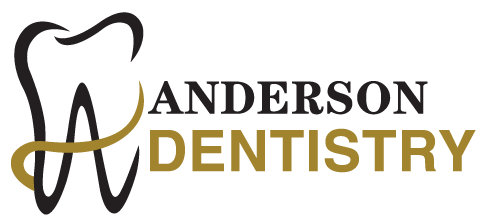Family Dentistry
Preserve Your Oral Health With Our Preventive Family Dentistry
Preventive Care For The Whole Family
At Anderson Dentistry, patients of all ages are always welcome through our doors. Both you and your children can expect to receive the routine care you need to prevent cavities and gum disease to maintain your beautiful smiles for life. We have a comfortable and relaxed environment as well as the expertise and advanced services necessary to ensure that everyone who comes to see us, has plenty of reasons to smile!
Comprehensive Exams
A dental exam is critical to your ongoing oral health—and only your dentist can perform this. The exam consists, in part, of the dentist looking inside your mouth. In the past, you may not have ever realized an exam was taking place. Perhaps you thought the dentist was checking the work the hygienist had just completed. Not so. Dr. Scott Anderson actually looks in your mouth for things that can affect your oral—and your overall—health. Many of these are things you can’t see on your own, but Dr. Anderson is trained to detect. Here are some of the things Dr. Scott Anderson is looking for during a dental exam:
Damaged, missing or decayed teeth.
Early signs of cavities.
Condition of your gums, such as periodontal pockets, inflammation or other signs of gum disease (which can lead to tooth and bone loss).
To see how previous dental work such as root canals, fillings and crowns are holding up.
Early signs of mouth or throat cancer, or blocked salivary glands.
Other suspicious growths or cysts.
Position of your teeth (e.g., spacing, bite).
Signs that you clench or grind your teeth (a treatable problem that can cause a headache or a sore jaw and can, if serious, lead to hearing loss and tooth loss).
The overall health and function of your temporomandibular joint (which joins the jaw to skull), checking for signs of disorders that can cause pain or tenderness.
The general condition of the bones in your face, jaw and around your mouth.
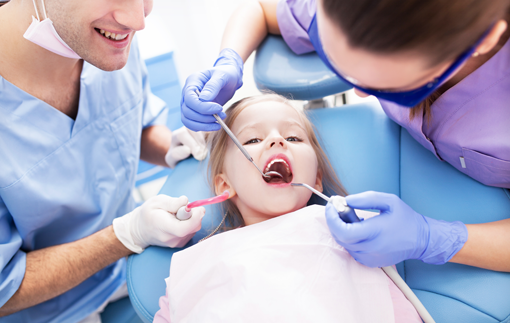

The dental exam can catch problems early—before you see or feel them—when they are much easier and less expensive to treat.
Digital X-ray Technology
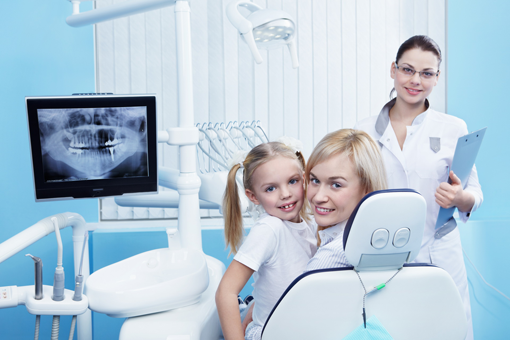
Digital x-ray technology helps us detect and diagnose many dental problems by taking a closer look underneath the surface of the enamel and gums. The latest x-ray technology reduces radiation exposure by 95 percent compared to traditional x-rays.
How Often Should You Get Dental X-Rays?
People who see a dentist regularly and have good oral hygiene and no current dental problems, might need bite wing X-rays of molars only every two to three years to check for early cavities. Children may need X-rays as often as every year or two because their teeth are changing rapidly.
Dental Cleanings
In addition to the dental checkup, an in-depth teeth cleaning with one of our talented hygienists will help get rid of decay-causing plaque, tartar and remove minor stains. By taking preventive care into consideration, you avoid any further complications that could lead to serious issues with your teeth and health. That is why preventive dentistry is on the rise lately. People realized that it is easier to prevent any dental problems and issues than treat and fix them later. Regular cleanings and exams could save you time, money and effort but most importantly, spare you the pain. Book your next dental cleaning with us today!
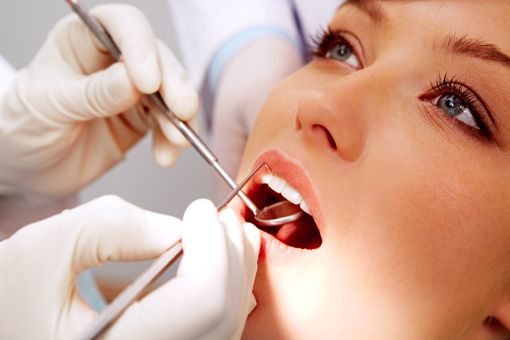
Preventing Gum Disease
Before
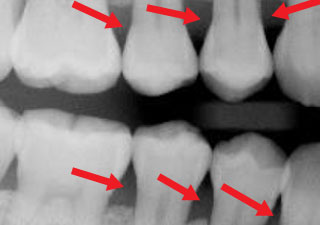
Crestal Bone is not visible
After
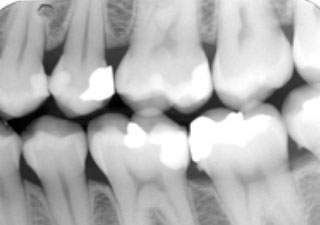
Crestal Bone is visible
Periodontal disease, also known as gum disease, is caused when bacteria in plaque (a sticky, colorless film that forms in the mouth) builds up between the gums and teeth. When the bacteria begin to grow, the gums surrounding the tooth can become inflamed. If left untreated, this inflammation can cause the gums and supporting bone structure to deteriorate. This can lead to gum recession or even tooth loss. In addition, research has shown that gum disease may be associated with other diseases, such as diabetes and heart disease. Luckily, periodontal disease can be prevented with the following recommendations:
Brush your teeth.
Brushing after meals helps remove food debris and plaque trapped between your teeth and gums. Don’t forget to include your tongue, bacteria loves to hide there.
Floss.
Flossing at least once a day helps remove food particles and plaque between teeth and along the gum line that your toothbrush can’t quite reach.
Professional Dental Cleaning.
Only a dental hygienist can remove tartar or dental calculus with the help of sharp dental instruments. This process is called dental scaling or professional tooth cleaning and is recommended every six months or more frequent in some cases.
VISIT US
Dr. Scott Anderson
277 King St. East,
Kingston, ON
K7L 3B1
HOURS OF OPERATION
Monday: 8:30 am - 5:00 pm
Tuesday: 8:30 am - 5:00 pm
Wednesday: 8:30 am - 5:00 pm
Thursday: 8:30 am - 5:00 pm
Friday: 8:30 am - 5:00 pm
Saturday: Closed
Sunday: Closed
